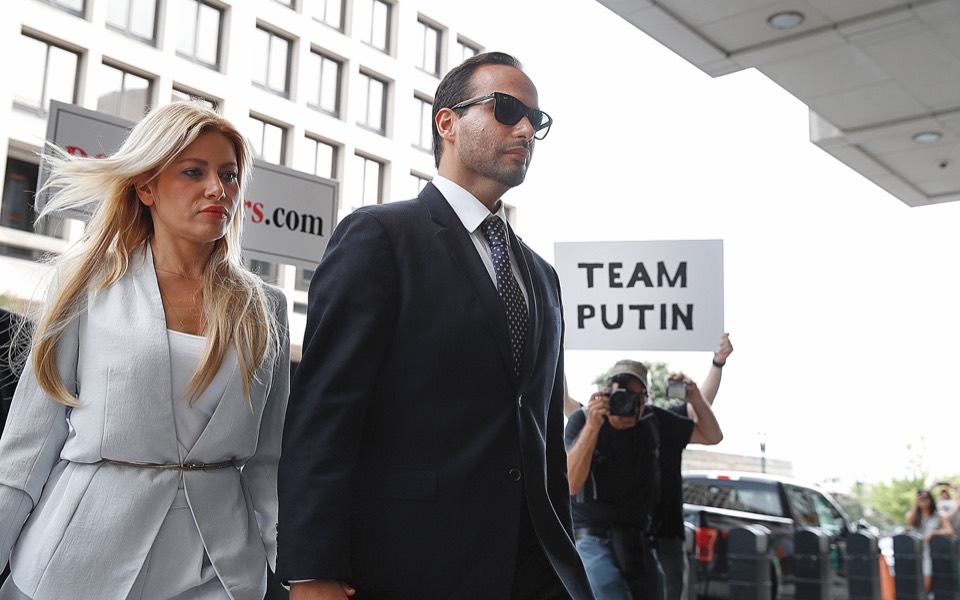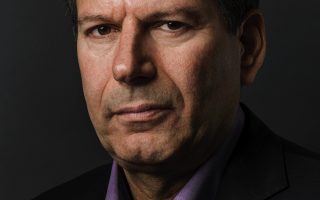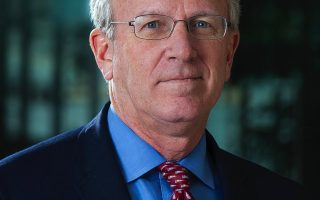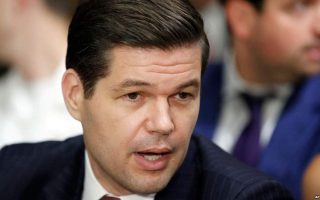George Papadopoulos: Trump, Hillary’s e-mails and me

George Papadopoulos’s book has a bit of everything: secrets and stories from Donald Trump’s campaign, where he worked, revelations about how even the most “difficult” ministries in Greece opened their doors wide, surveillance and spies from a number of countries and, of course, unknown details on how the search for Russian meddling in the 2016 presidential election got under way. This is a story – his version, at least – of the young Greek American who almost made it to the White House but ended up in jail instead.
The story begins in a prison cell. It is July 28, 2017 and his fellow inmates are trying to convince him that not all is bad in the prison. “The chicken wings they serve on Wednesdays are really good,” they say.
Papadopoulos can’t believe what he’s going through. Sleepless and scared, he is trying to come to terms with the fact that he faces 25 years in jail.
The previous day, he had been in Greece. As soon as his plane landed in Washington, DC, he was arrested. “This is what happens when you work for Trump and Russia,” he claims he was told.
“This is my story, my nightmare, and, I hope, my redemption,” he writes in the foreword to his book “Deep State Target: How I Got Caught in the Crosshairs of the Plot to Bring Down President Trump,” which was released Tuesday.
In his book Papadopoulos constantly refers to his Greek roots, his ties to Greece and his contacts here. “For the [Trump] campaign I was the Greek guy. I was born in Chicago but we didn’t stay in town long, we relocated to Thessaloniki… We moved back to Chicago just before I entered kindergarten. At that time, my Greek was better than my English,” he writes.
Following studies in the US and the UK, Papadopoulos began working at the conservative Hudson Institute in Washington, DC. He soon discovered the importance of networking and that the best way to do so was through the Greek-American community. At a reception, he met publisher and political lobbyist Aristide Caratzas. “I’m impressed. Here is a Greek American who seems connected to politicians without being tied to the Greek Orthodox Church,” he thought.
Papadopoulos told Caratzas about his interests, mainly in the geopolitics of energy, and his thoughts on the subject: “The collapse of Israeli-Turkish relations and how this seems like a great moment to promote an initiative between Greece Cyprus and Israel.” Caratzas was impressed and gave the Hudson Institute a $100,000 check so that the then 25-year-old Papadopoulos could develop his ideas and present them at a congress.
In the summer of 2015, Papadopoulos was at work when he watched Donald Trump announce his candidacy for the Republican presidential nomination. “I announced that I think he has a real chance. Everybody laughs at the idea,” he recalls in his book. He himself saw Trump like a stock. “In order to profit from it, I have to buy low,” he thought, before firing off an e-mail to Corey Lewandowski, Trump’s campaign manager since January 2015 (until he was fired in June 2016, having clashed with Paul Manafort).
Papadopoulos introduced himself to Lewandowski with that e-mail and outlined his interests, views and strengths: “Greece, Cyprus, Israel, pro-business, energy connections, relentless networker.” Lewandowski replied, “I’d like to connect you to the best possible person within the organization.” But Lewandowski didn’t follow up on that immediately and Papadopoulos decided on another strategy: to work on another Republican nomination campaign so that, when that person quit the race, he could join the Trump campaign. That’s how it happened: In March 2016, Papadopoulos was interviewed by Sam Clovis, a retired US Air Force officer and talk radio host who had become national co-chair of Trump’s campaign. They discussed the interviewee’s interests and the need to improve relations with Russia. “You are perfect, you are the best guy in the world for what we need,” Clovis said, offering Papadopoulos an unpaid position as foreign policy adviser.
Before joining the campaign, Papadopoulos attended a conference in Rome, where he was introduced to Joseph Mifsud, an academic who would play a key role in his subsequent adventure. “I’m going to introduce you to everyone and set up a meeting between Trump and Putin,” Mifsud said. A few days later, Mifsud invited Papadopoulos to a dinner with a woman whom he introduced as Putin’s niece. “Olga is going to be your inside woman to Moscow,” he said. A delighted Papadopoulos reported to the Trump campaign. They responded: “This is most informative. No commitments until we see how this plays out… Great work.”
A few days later, Papadopoulos met Trump himself. Under very strict security, he and other advisers were led to a conference room. In lieu of breakfast, there were bowls of Snickers chocolate bars. Papadopoulos introduced himself to the boss. “I’ve been in contact with people in Europe who are eager to set up a meeting for you with Russia,” he said and described the scene.
“Trump nods noncommittally as if he is processing the idea. ‘What do you think Jeff?’ he asks [then Senator and future Attorney-General Jeff] Sessions. ‘It’s a good idea. We should look into this,’ Session responds.”
Back in London, Papadopoulos continued his contacts, reporting every step to the Trump campaign. On April 26, he met Mifsud again, this time for breakfast, and the professor said: “The Russians have dirt on Hillary Clinton. Emails of Clinton, thousands of emails.” Papadopoulos claims he froze upon hearing this and that he did not discuss it further. But he continued his contacts with Mifsud. “I write emails expressing my gratitude for this help. I tell him that if we can pull off a meeting it will be historical.” And the info on Clinton? He claims he did not tell anyone at the time. He did that later, at a ministerial office in Greece.
Papadopoulos arrived in Athens in mid-May 2016. He wrote the Trump people that his purpose for the trip was dual: to get a better understanding of Greek-US relations (to help Trump get the votes of the Greek-American community) and learn more about NATO’s role in the Mediterranean.
One of Papadopoulos’s first appointments was with then defense minister Panos Kammenos. When he arrived at a restaurant, he was told, “Please take the battery out of your phone.” The two men drank ouzo and got a little buzzed. “Panos is a gregarious, funny man, and there is instant chemistry,” Papadopoulos writes in his book, reporting what Kammenos told him: “Papadopoulos, Obama’s shitting on me. [Defense Secretary Ashton] Carter humiliated me. He had me meet with his deputy. They think I’m some sort of Russian supporter. I want to be NATO’s best friend. My objective is to have the United States move its nuclear weapons from Incirlik Air Base in Turkey to Souda Bay. You need to introduce me to the US ambassador here and the military attache.”
The next day, Papadopoulos met Defense Attache to Greece Captain Robert H. Palm and reported on what Kammenos said. “A few days later, I learn that Palm and the US ambassador met Panos. Both parties thank me for my intermediary role.”
Papadopoulos reports in detail his meeting with Egypt’s ambassador to Greece (and claims that it is thanks to that meeting that Republican presidential nominee Trump met Egyptian President Abdel Fattah el-Sisi on September 20, on the sidelines of the UN General Assembly) and Greece’s then foreign minister Nikos Kotzias. “It’s another friendly meeting with coffee and fruits. Then [Kotzias] tells me that ‘tomorrow Putin will be sitting right where you are sitting.’” The remark caught Papadopoulos by surprise and led him to confide something that, as he claims, he had told no one before. “I heard the Russians have Clinton’s emails.” According to Papadopoulos, Kotzias changed color and said, “Do not ever repeat that again.” Papadopoulos left Greece anxious that he had made a fatal mistake.
Back in the US, Trump’s campaign people told him that he would lead a “Greeks for Trump” coalition, and some confided “that Trump initially threw his hat in the ring as a low-cost way to extend his brand” and that he never believed he would win the Republican nomination, never mind the presidency.
On November 9, 2016, Trump became the accidental president. Papadopoulos’s phone was on fire. Among those calling him to offer their congratulations was Greek Prime Minister Alexis Tsipras. The UK Foreign Office forwarded him Prime Minister Theresa May’s letter of congratulations and asked him to fix a call with the president-elect. “A job in the new administration seems entirely within reach,” he says in his book.
A month after Trump’s victory, Papadopoulos met Father Alex Karloutsos, assistant to Archbishop Demetrios of America and whose son Michael would be appointed deputy chief of protocol at the State Department in 2017. Father Karloutsos is “one of the most politically connected people I have ever met. He has both sides of the political aisle covered,” Papadopoulos writes.
“[Karloutsos’s] message to him was: I’m going to get you together with [Reince] Priebus [Trump’s newly appointed chief of staff, whose mother is Greek American]. It will help you get a job with the administration. But I need you to come to Greece. I’m hosting a conference in Drama.” Papadopoulos accepted: “I guess he wanted someone on site with ties to the administration that he could point to.” But the trip was a disappointment: “A lot of people ask me to convince the president-elect to build a Trump hotel in Athens. I just laugh. They persist despite my admonishments.”
Papadopoulos also traveled to Cyprus and met President Nicos Anastasiades. The president was smoking a cigar and in a good mood: “Thank God Trump won!” he told Papadopoulos. “[Anastasiades] wants to get rid of the British bases and replace them with American boots,” Papadopoulos writes. He adds that he also had an extended conversation with Kammenos and they discussed the minister’s “ideas about Americans building a new base on the island of Karpathos and forging an agreement to vanquish debts in exchange for obtaining all of Greece’s natural reserves for American companies.” Papadopoulos reported on his trip to Michael Flynn, Trump’s first, and very short-lived, national security adviser, as well as other officials. “Their response was enthusiastic,” he writes.
A few days after the inauguration, the phone rang. Was it for the much-desired interview for a job in the Trump administration? Not quite: “This is the FBI. We’d like to interview you.” Papadopoulos thought it was some kind of joke: “I’m shaving right now but sure, I can talk to you. Where are you?” They responded by pounding his front door. “Open up.” The agents asked him to follow them and warned: “If you tell us the truth, you won’t get in trouble.” They interrogated him about all his meetings and asked who in the campaign knew about Russian interference in the election. “No one as far as I’m aware,” he replied. They insisted. Papadopoulos felt ill at ease and decided to tell them about Mifsud and Clinton’s e-mails. They asked for dates, but he did not tell them the truth.
Back home, Papadopoulos withdrew his job application. “My dream is over, nine months of work down the drain,” he writes. On February 16, the FBI called again. They asked him who among the Tump team knew about the e-mails. Papadopoulos insisted he had spoken to no one. (Even today, he insists he had only told Kotzias. When it became known that he had also told Alexander Downer, the Australian high commissioner to the UK, he denied it, saying he had been the victim of a plot and that Mifsud was sent by the “deep state” so that Papadopoulos and the Trump administration could be accused of colluding with Moscow to subvert the presidential election.)
The next weeks were difficult for Papadopoulos: “The FBI can turn your life into a living hell. They question friends and family. They all start to disappear from my life. Its like I have social leprosy.” He decided to go to Greece so he could be forgotten. But just before boarding the plane at the airport he was stopped and sternly asked, “Are you coming back?” They asked for his contacts in Greece. “I can’t tell if I’m paranoid or people are following me everywhere,” he writes of his stay in Athens and on the island of Myconos. At the same time, he was treated like a celebrity by politicians and total strangers. He was asked to judge a local beauty contest, had fun and was offered jobs.
But on his return to the US, he was arrested by the FBI under conditions of great secrecy. His sentence – 14 days in jail for perjury – was the first in the FBI search.
His future plans? He is determined to get into politics. “I don’t feel like an ex-con. I feel like a patriot and warrior. And that is precisely what I plan on being,” he writes in the book’s epilogue.





